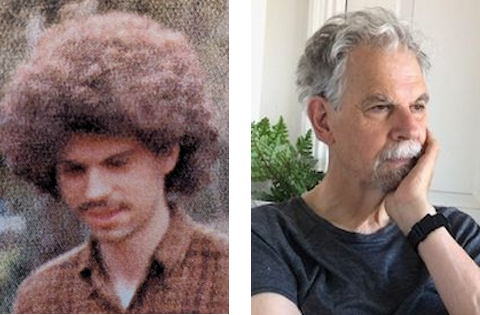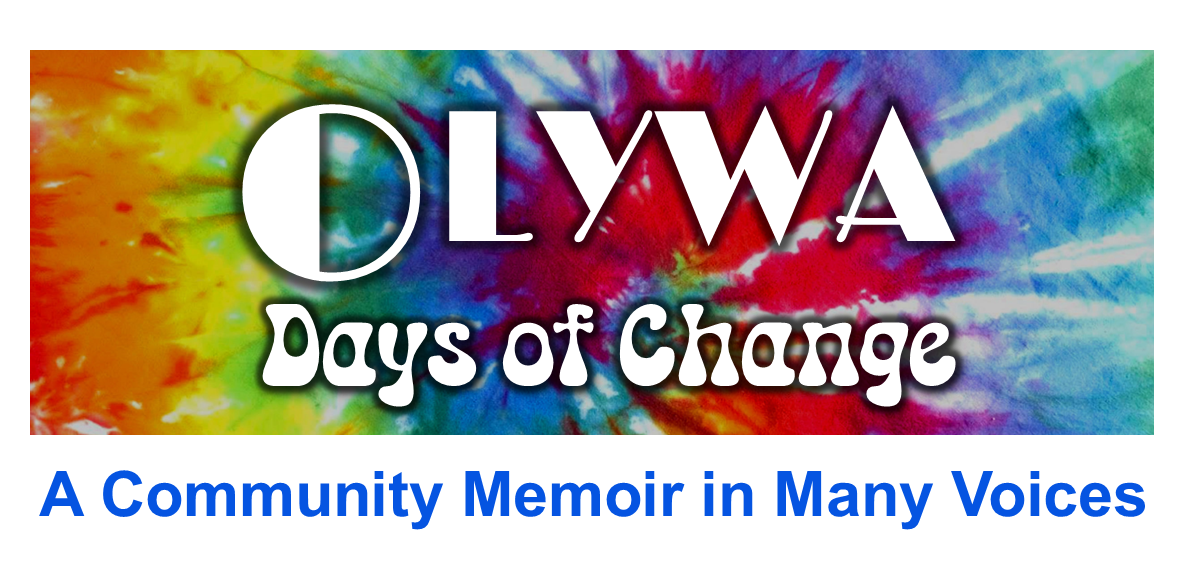
Joe came to Olympia in 1974 after dropping out of college at Gonzaga in Spokane. He was looking to join a commune like the ones he’d visited in San Francisco on several hitchhiking trips. Here in Olympia he found Cold Comfort Farm with its cows, goats, and chickens, and its sauna, and geodesic dome. Perfect! He set up shop as a sign painter (Buffalo Sign Co.) and got involved in a variety of civic and artistic projects. His public art pieces are on view around Olympia if you know where to look. There’s a carving of an Orca on the boardwalk, and the mural reproduction of Hokusai’s wave, not to mention several surviving wooden signs.
- Getting Lumber for the Dome – By Joe TougasAt one point in the evolution of Cold Comfort Farm the commune members decided to build a geodesic dome. We were then faced with the challenge of finding the materials. The word went out via the invisible network that connected the devotees of the “buy nothing” ethic. The power of a community to “manifest” whatever was needed had proved miraculous in the experience of back-to-the-landers everywhere. The fact that we were seeking material for a geodesic dome clearly helped stimulate and activate that network. What we needed for the frame was a bunch of 2×6s, the longer the better
- Our Toilet Was a Scorpio – By Joe TougasThe one plague of that old house that we hadn’t really come to grips with, even into the second year of your residency, was the toilet . . . What typically happened was that some new crisis would arise, and would be attacked with some new strategy or tool. A clog would eventually be displaced, and everything would be perfect for a few days, or even weeks. But soon a new problem would arise. It was as if the toilet had become bored with the routine and needed some new excitement. One of the residents, who had been studying about mental health issues at Evergreen, suggested that the toilet might be bipolar . . .
- Men in Black at the Food Stamp Office – By Joe TougasDonna, Sally, and I were talking over dinner the other evening about the way that the level of friendliness toward strangers had changed over the years, especially the way that people had become a little more guarded in how they interacted with government officials. Donna said, ”There was that time at the food stamp office, right? Did I ever tell you about that? Now that was a pretty flagrant example of hostility.” “No,” said Sally. ”I don’t think I ever heard about that.”
- The Sauna, the Goddess, and the Mushrooms – By Joe TougasFor several years in the ’70s, the folks at Cold Comfort hosted what they called a Harvest Festival . . . One of the highlights of each of these gatherings was firing up the sauna . . . “I was standing in the shadows, observing the scene as the cloud of smoke and steam began to dissipate and the circle of joyous celebrants around the altar began to reassemble. I saw the most amazing sight. One of the glorious bodies stepped into the candle-lit circle and stood for a moment lit by the sparks from the holy fire . . .”
- A Ride on a Trustafarian Sailboat – By Joe TougasI was just getting set up for some focused work with the One Shot sign paint, my paper pattern, and my brushes, all laid out on my workbench. Without warning, there was a series of taps on the shop door. It was not an aggressive banging like you would use to wake the occupants of a house on fire. It was more like the friendly beeping that Northwesterners use to greet friends while driving down the street. It was a “shave and a haircut” rhythm. I put down my brush and went to the door to see what was going on. It was my friend Trip, a happy-go-lucky guy who was a frequent visitor on that bustling section of 4th Avenue . . . “Listen bro, this is a once-in-a-lifetime event—a meteorological trifecta. The tide is just right for sailing out to Hope Island, going out in the morning and coming back in the afternoon. Wind speed and direction are perfect, and this sunshine, my god! . . .”
- Acres of Clams – By Joe TougasThe message of the song resonated with a sense of abundance and generosity that made an impression on young people . . . That sense of abundance was also captured by another phrase from Indigenous culture, popular with tour guides and waterfront developers: “When the tide goes out, the table is set.” You can imagine how that sentiment would be received by young people from back east or California ending up in Olympia and hearing stories of going down to the beach and coming back with a gunny sack full of free seafood delicacies.
- Whimsical and Creative Names of Group Houses and Collectives 1960 – 1989 – By Joe TougasOne of the interesting practices that was characteristic of the Olywa local culture in the 1970s was the naming of the various houses and households . . . The number of houses with names ballooned over time. Recently, when a request went out for people’s memories of those named households, the response was huge. Here is a list of over a hundred names dredged up from peoples’ memories and documents.
- Smokin’ on the Dock of the Bay – By Joe TougasThat day I was walking through a trashed-out industrial part of the old downtown . . . I saw a rusty fire escape going up the side of one of the rough concrete buildings. I climbed the stairs, noticing how one tread was hanging loose, up to the landing where I could sit and have a look around. I immediately saw that this was a bitchin’ spot. You could see a long way in all directions. Across the street there was a row of sheds or warehouses hanging over the water. Much of the corrugated metal siding had been ripped off, and it was obvious that most of those buildings had not been used in a long time.
- Making Hay While the Sun Shines – By Joe TougasCold Comfort Farm took the “Farm” in its name seriously. We thought of ourselves on the model of agricultural co-ops. We wanted to be independent, creative, revolutionary. We were pretty smug about our agrarian accomplishments. Although our knowledge of small-scale farms was spotty and romanticized (not to mention borderline illegal) we were proud of our worn-out overalls and home-grown strawberries and broccoli.
